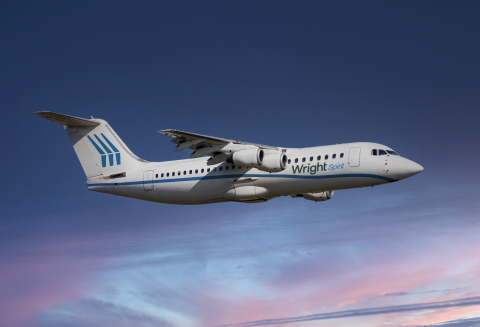ALBANY, N.Y.--(BUSINESS WIRE)--Wright Electric, Inc., a leader in net-zero propulsion and aircraft design, announced the launch of a new addition to their family of zero-emissions aircraft for the commercial market. The announcement is being made today in conjunction with COP 26 UN Climate Change Conference in Glasgow, Scotland. The Wright Spirit will incorporate Wright’s megawatt-class electric propulsion system and serve the 100-passenger market for one-hour flights.
The Wright Spirit aircraft design builds on the BAe 146 platform - a 100 passenger, 4-engine aircraft known for its operation out of noise-sensitive airports. “Aviation has committed to net-zero carbon emissions by 2050, but Wright is committed to a 100% reduction in all emissions starting in 2026,” said Jeff Engler, CEO of Wright. “Because we built the world's largest aerospace propulsive powertrain, we can build the world's largest zero-emissions retrofit directly serving the world's busiest routes."
The path was set in early 2020 with Wright’s announcement and development of their megawatt propulsion system for an all-electric commercial aircraft. Throughout the last two years, the company has been proving key components of the system including a high-efficiency, high-power density inverter and a 2 MW (2,700 HP) motor. The existing hydrocarbon-based propulsion system will be replaced with Wright’s all-electric, emissions-free propulsion system.
By focusing on one-hour flights, the Wright Spirit addresses the world’s busiest city pairs, such as Seoul-Jeju (world’s busiest route, 14 million passengers annually), London-Paris, Rio de Janeiro-São Paulo, and San Francisco-Los Angeles. “We can make a significant impact on global emissions by targeting this high-demand segment of the market,” says Jeff.
Juan Carlos Zuazua, CEO from Viva Aerobus said, "Viva Aerobus is excited to support the development of the Wright Spirit as a member of the advisory board. As the Greenest Airline in Mexico, we are focused on aviation's commitment to greenhouse gas reductions. We look forward to collaborating with Wright to analyze the integration of a zero-emissions 100-passenger aircraft into airline operations."
David Morgan, Director of Flight Operations at easyJet added, “We believe zero emissions aircraft are key to addressing aviation’s environmental impact and so we fully support Wright Electric in their ambition to bring a zero-emissions aircraft to market. Wright have come a long way since we first started working with them in 2017 and we welcome this announcement as another important step on their journey.”
To develop the integrated propulsion system, Wright has assembled an innovative team of companies with expertise in generation, energy storage and propulsion design. The program now proceeds with on-going ground testing and final selection of the propulsion system. In 2023, the aircraft will begin flight testing with one all-electric propulsor. The development program will then accelerate towards flight testing with two all-electric propulsors by 2024 leading to the full-electric aircraft by 2026.
For additional information about Wright and the advanced technology driving these developments, please contact Emily Hickmott at emily.hickmott@weflywright.com.
About Wright Electric
Wright Electric, Inc. (Wright) is a U.S.-based company developing the world’s first family of zero-emissions commercial aircraft. The company was founded in 2016 by a team of aerospace engineers, powertrain experts, and battery chemists. By focusing its resources on the technological and component challenges to electrification, Wright Electric is establishing the path towards a carbon-free aviation footprint. Wright's flagship airplane under development is the Wright 1, a 186-seat airliner with an 800-mile range, targeting entry into service in 2030. Wright works with airlines such as easyJet and VivaAerobus, and has development contracts with NASA and the U.S. Department of Energy’s ARPA-E. Wright has been funded through Y Combinator, the Clean Energy Trust, venture funds, and family offices.
About Viva Aerobus
Viva Aerobus is Mexico's ultra-low-cost airline. It started operations in 2006 and today it operates the youngest fleet in Mexico and the 2nd youngest fleet in all North America with 50 Airbus: 40 Airbus A320 and 10 Airbus A321. With a clear vision to give all people the opportunity to fly, Viva Aerobus democratized the airline industry with the lowest fares in Mexico and the lowest costs in Latin America.
About easyJet
easyJet is Europe’s leading airline offering a unique and winning combination of the best route network connecting Europe's primary airports, with great value fares and friendly service. easyJet flies on more of Europe’s most popular routes than any other airline and carried more than 96 million passengers in 2019 – more than 16 million travelling for business. The airline has over 300 aircraft on nearly 1000 routes to more than 150 airports across 35 countries. Over 300 million Europeans live within one hour's drive of an easyJet airport.




